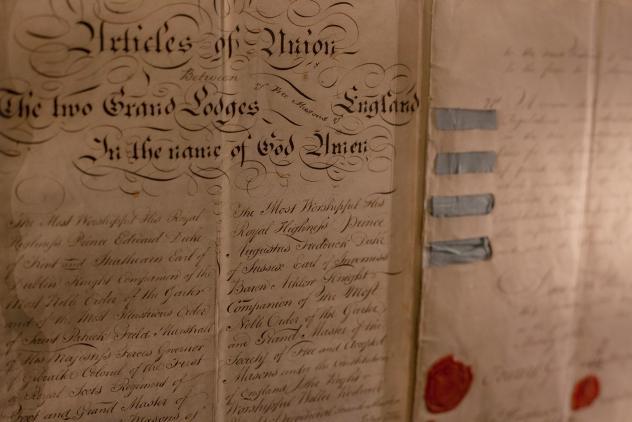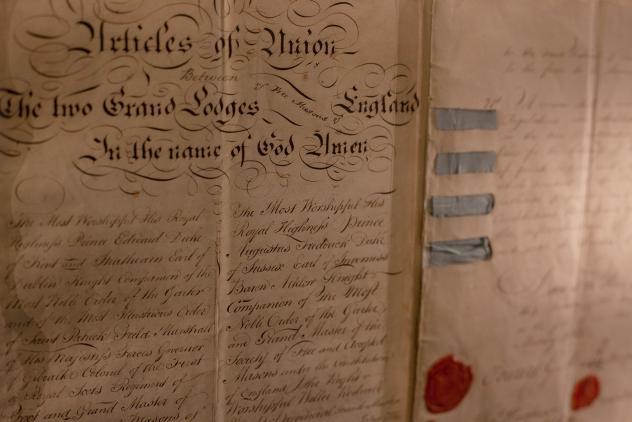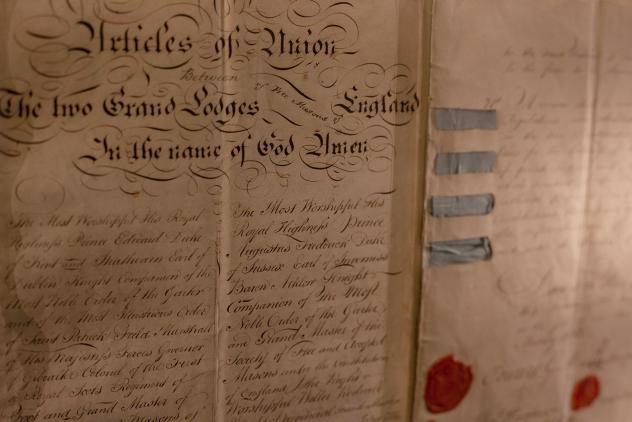Collections Conservation and Care Policy
Name of museum: The Library and Museum Charitable Trust known as The Museum of Freemasonry (“the Library, Museum and Archives”)
Name of governing body: The Council of the Library and Museum Charitable Trust
Date on which this policy was approved by The Council of the Library and Museum Charitable Trust: 12th September 2019
Date at which this policy is due for review: September 2024
Introduction and statement of purpose
The Museum of Freemasonry houses one of the world’s leading collections of Masonic books, artefacts, archives and ephemera. The whole collection held by the Museum was awarded Designated status by the Museums, Libraries and Archives Council in 2007.
The statement of purpose of the Museum of Freemasonry, as expressed in its Trust Deed is:
To collect, preserve, conserve, display and make available to enquirers the archives, records, printed material, regalia, jewels and artefacts of Freemasonry and the continued running of a library and museum for the benefit of the general public and making the items available for research and education and the preservation of the items as collections
This policy sets out the principles according to which the Museum of Freemasonry will care for and conserve the items in its collection. This standardises the practice of conservation and care for items held in the collection and ensures continuity of practise by all staff members, now and in the future.
A digital copy of this policy can be accessed by all staff members via a computer. It is also available to view on the Museum of Freemasonry’s website.
This policy should be read in conjunction with the Collections Conservation and Care plan, Collections Development Policy, Loans Policy, Access Policy, Emergency Reaction and Recovery Plan and the Environmental Sustainability policy; all of which impact on collections care.
The purpose of the Collections Conservation and Care Policy is to set a framework for:
- The preservation of the collections in the care of the Museum of Freemasonry
- Preventative and remedial conservation of the collections
- The safe use of and access to collections, within the limits of the Museum of Freemasonry’s resources
Context
The Museum of Freemasonry aims to improve the care and conditions of all its collections in accordance with the following legislations, standard and ethical guidelines:
- Code of Ethics for Museums (Museums Association)
- Library and Information Association (CILIP)
- Archives & Records Association UK & Ireland Code of Ethics (2018)
- Benchmarks in Collections Care (Collections Trust)
- SPECTRUM: the UK Museum Collections Management Standard
- ICON Professional Guidelines
- British Library Preservation Advisory Service
- PAS 197:2009 Code of practice for cultural collections management
- BS 4971:2017 Conservation and care of archive and library collections
- BS EN 16790:2016 Conservation of cultural heritage. Integrated pest management (IPM) for protection of cultural heritage
The safety and preservation of the collection will be considered from the outset of any plans to alter the displays or storage, to modify the buildings or to allow access to any part of the collections.
Conservation, Collections Care and people
Caring for collections is a fundamental duty for all libraries, museums and archives, to ensure that care, documentation, storage, location control and use will adhere to appropriate national and international guidelines, accreditation standards and codes of ethics.
The Museum of Freemasonry staff care for our collections, and use their judgement, experience, analysis and consultation with colleagues to consider the appropriate levels of conservation needed and the best storage for all items.
All members of the collections staff are responsible for reporting issues related to the collection, including signs of deterioration to particular items, to the relevant department head (Librarian, Curator and Archivist) at the earliest opportunity. Similarly, front of house staff have a responsibility to report any changes they notice to items on display or the surrounding environment.
All new staff and volunteers are provided with tailor made training in object handling, hazard and condition surveys, object awareness and triage by appropriate teams who work with the collection regularly. It is the responsibility of all staff to follow collections care guidelines and procedures when working with the collections. No untrained personnel are allowed to handle items from the collection.
Researchers or other visitors working with the collections are briefed on how to handle the items they are working with and are supervised at all times.
Collection Conservation and Care management
Conservation is a profession devoted to the preservation of cultural heritage for the future. Our policy for the care of the collections is based on a combination of preventative and remedial conservation, both designed to ensure preservation.
Preventative conservation requirements seek to balance, as far as possible, access and the use of the collection with the need to preserve collection items. It aims to retard or minimise deterioration and prevent damage to museum items, books and archives by managing risks wherever they are stored, handled or displayed. The necessary preventive measures are based on a thorough understanding of how items in our collection react to their environment and deteriorate physically or chemically.
We provide suitable and stable environmental conditions for the collection, in the galleries, in the stores and in transit. The team monitor and control the environment (temperature, light, relative humidity and pests) appropriate to the materials and use collated data to recommend improvements. Housekeeping regimes include an Integrated Pest Management (IPM) programme. Regular cleaning, identifying and zoning sensitive materials and training for wider teams are all key components to its success.
Remedial conservation involves a treatment to an item in order to stabilise it or enhance some aspects of its cultural or research value. The Museum of Freemasonry will not normally accept items already requiring remedial conservation.
For remedial conservation, the Museum of Freemasonry, seeks services from accredited conservators included on the Conservation Register operated by the Institute of Conservation (ICON). All conservators are expected to provide a condition report and treatment proposal that must be approved by members of the Museum of Freemasonry collections team prior to any work being undertaken. Appropriate contracts will be put in place with all conservators or conservation studios/companies prior to work being carried out on collection items. All conservation treatments will be documented both photographically and in writing, in line with standards laid down by SPECTRUM and ICON guidelines.
Collections Conservation and Care at the premises of the Museum of Freemasonry
The Museum of Freemasonry is located within the Grade II* listed Freemasons’ Hall, built 1927-1933 and relies on maintenance, security and infrastructure services provided by the United Grand Lodge of England (UGLE). The core of this collection is a loan of items, books and records from UGLE. We will maintain a close relationship with UGLE to ensure that the services that they provide are, as far as practical, of a type and standard that will support the objectives in this policy.
Collection items are only lent to or stored in facilities that can provide appropriate collections conservation and care standards.



